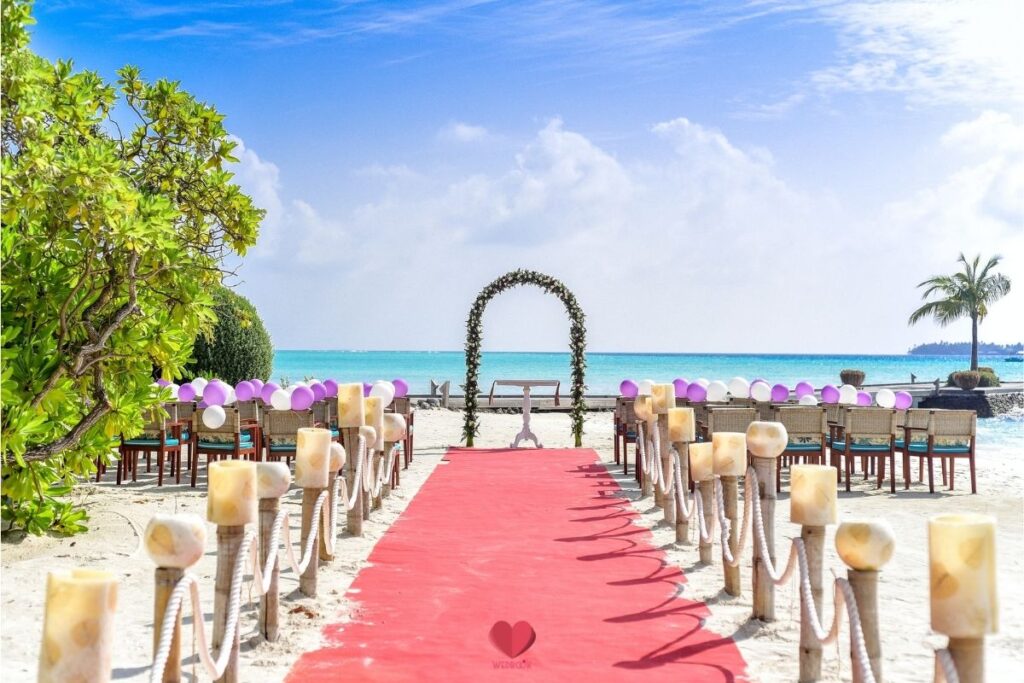Flying off your guests and yourself to a picturesque location to get married in a serene, intimate setup is the short & sweet answer to “what is a destination wedding”. But seldom are things as simple as they sound. There’s obviously more to the concept of destination weddings and how to properly plan one. After all, flying off to a foreign land is dreamy, sure, but it’s also a hefty task to plan a wedding with all the nitty-gritty details in a place you hardly know anything about. We’ve got you though (like always!). In this blog, find your answer to “what is a destination wedding”, alongside a step-by-step guide on how to plan one.
What exactly is a destination wedding?
A destination wedding is a wedding held away from your residential town where all the guests & family gather to celebrate your union. A destination wedding can be held 100 km from your residential town or in a whole different continent altogether. The point is to have all the friends & family in one place, wherever that is! Most people generally confuse the destination wedding idea with a quite far-off wedding in a tropical setup
What are the rules for a destination wedding?
7 Destination Wedding rules & etiquettes:
- Inform the guests as soon as possible. A destination wedding means you need to send save-the-dates at least 6 months in advance and invitations at least 3 months in advance. So the guests can plan for the getaway and you, as a couple, can book the accommodation depending on who’s attending.
- Don’t choose a location that’s expensive for some of your guests. Select some accommodation options that are in the budget for all those who’re invited. This includes suggesting hotel options near to the hotel where the wedding will be held.
- Have a wedding website where helpful information like flight schedule, event dates, break-down, weather forecast, dress-code information, local culture, etc. are mentioned.
- Provide chances to mingle. Destination weddings are a week-long affair and it’s best that the guests know each other so they can have a good time throughout the nuptials. A good idea is to host a welcome brunch or dinner for all the guests.
- If you’re including local culture and traditions in the wedding, make sure they aren’t offensive. This is where hiring a local wedding planner pays off.
- Create a warm, refreshing welcome experience, like transportation from the airport, welcome gift bags, a varied lunch/ dinner with local food, etc.
- Be social and make sure everyone is comfortable and doesn’t have any problems during the stay. You don’t have to go out of your way to talk to them. But a warm conversation gives them the respect they deserve since they traveled to a far-off location for your special day.
What’s the key difference between a traditional wedding and a destination wedding?
Traditional weddings often happen in a venue closer to the couple’s home. It’s in the city or just an hour or two drive from the city. Destination weddings are generally planned in a far-off location. This can be within a 100 km distance of the couple’s hometown or farther away from that. This is the only key difference between a traditional and a destination wedding. Rest all are relative, like cost, planning difficulty, etc., and can depend from couple to couple.
Are destination weddings cheaper than traditional weddings?
Destination weddings are cheaper than traditional weddings. The reason is simple. When planning a destination wedding, families often resort to a shorter guest count list. Plus, more than 30% of your guests will RSVP no because of the added expenses or some other plans when the wedding is scheduled. Of course, if you’ve planned a luxury destination wedding or booked expensive accommodation, the cost will be higher than a local wedding. In the end, it all depends on your budget and how much you want to spend. But the average cost tends to decrease for a destination wedding because of the fewer number of people who attend the nuptials.
Your 11 Step-by-Step Guide To Planning A Destination Wedding
#1 Set A Budget
Destination weddings can cost more or less than a traditional wedding depending on many factors. You can save on destination wedding by taking a package from the resort, wherein they include everything from decor to food to stay, it can although cost more if there are more events, and it’s the peak time. When planning the budget for a destination wedding, these are some of the foremost factors to consider: travel and lodging costs, location, peak time, number of events, wedding vendors like a florist, makeup artist, etc, charges, and food. Keeping the main costs in mind, come to a realistic budget, and then factor in the unexpected expenses like non-vendor tips, shipping costs, baggage fees, etc. They are bound to happen. Make 10% of your total budget into unexpected expenses.
#2 Hire A Destination Wedding Planner
It’s evident that destination wedding takes more careful planning than local weddings. Some factors like visiting the venue multiple venues or knowing local vendors aren’t feasible or difficult to navigate when you’re planning a destination wedding. This is where hiring a destination wedding planner can make the entire wedding planning experience easier and more fun-filled. We’d suggest hiring someone who has already planned a wedding in the chosen location.
A destination wedding planner can help in a number of ways like providing guidance on local laws of marriage license and permits, creating a realistic budget, factoring in unexpected experiences like local weather or insider hotel knowledge, having local connections, making recommendations, and handling guest list.
#3 Go Local & Save Money
Going local not only helps you and your guests to experience the local culture but is also a great way to save money and support the environment. Having wedding vendors flying off from your location means increased charges for accommodation and travel. Instead, have someone local serve you on the wedding day. If you’re hiring a destination wedding planner (which we really think you should), they will know vendors who are experts and fit your budget. Another way to go local is to include local flowers and food, like primroses and red poppies in Tuscany, and manapua in Hawaii.
#4 Consider Guest Lodging
While destination wedding etiquette doesn’t dictate you have to cover the lodging costs, it’s thoughtful to book rooms in different budgets. We’d recommend looking into hotel blocks wherein a group of rooms – in close quarters – are booked by the couple and they get an agreed-upon rate. This rate is usually lower than the usual tariffs. This gives your guests the advantage of choosing a room in their budget for a convenient experience.
You can also give them the option to pick another hotel in a 10-minute radius (maximum 15) to accommodate all budgets. Set your dates only after you can assure everyone has a room available for them to stay and unwind.
#5 Meet The Vendors
Sometimes even plenty of Instagram research, reading reviews, and phone calls don’t give an idea of what the vendor’s working style is and whether they’re a perfect fit for you. Meeting the vendor helps you determine if they’re the right person for your big day, if the vibe is right, and if you can trust them with your wedding vision. With destination weddings though, things can get tricky. There are chances you’ll be hiring someone local as your wedding vendor (and that’s the smart choice), hence, schedule a trip to your destination wedding location. You’ll be visiting once surely for checking the venue, and it’s best that you also shortlist the wedding vendors at the same time. This way you can get it all done in one trip and be at peace for the rest of the wedding planning journey.
#6 Plan For Extra Luggage
Packing for a destination wedding can be tricky and you’d need to make checklists for what you want to bring and how to divide them into multiple suitcases. A smart way to make sure you don’t end up paying $$$ for extra luggage is to plan for it. Send some things to the destination beforehand – like decoration items, miscellaneous things, welcome bag items, etc. Don’t send them to the hotel itself, send them to a person you trust like a hotel executive who’s planning your wedding or your wedding planner. Don’t ship things like your wedding gown or the groom’s dress, etc. basically anything you’ll need on the wedding day. Regarding the wedding dress, ask the designer how to pack the gown so it doesn’t crease or get spoiled during travel.
Figure out what airlines you’re working with and what’s the baggage allowance. This includes the number of bags you can bring, the size, and the weight of each one. Ask your family & friends how many bags they’re bringing and you can add your bags if their allowance doesn’t exclude the existing limit. Another way to get an extra baggage allowance is to upgrade your ticket to a business or first-class ticket. Sometimes upgrading a ticket is cheaper than paying for extra bags.
#7 Take Into Account Weather & Temperature While Planning For Outfits & Ceremony Locations
When purchasing your dream wedding dress, keep into account the climate and terrain. While a ball gown is incomparable to make you feel like the princess you are, the aesthetic and the clothing will not with the hot, humid tropical climate like that of Hawaii or Mexico. For places like these, a lightweight lace gown with less trail is better suited. (Trails can be worn if there’s a carpet so you don’t carry the sand with you.) A belle of the ball gown is better suited for a villa wedding in Tuscany or France. It’s also considerate to keep some casual footwear for guests if you’re having the ceremony on the beach.
Similarly, if you’ve always wanted an outdoor wedding, consider the temperature and climate. Beach weddings are dreamy, but if there’s a forecast for winds or rains, all the planning will go to waste. To be safe, you can plan another backup setup in the banquet inside, just in case. And while crashing waves are peaceful, you’d want your guests to hear your vows. Make sure the mics and speakers are arranged well everywhere, for the ceremony and the reception as well, if it’s also arranged outdoors.
#8 Prepare Lists
When you’re marrying in your local area, even when you miss out on anything, it’s easy to arrange the same because you know the surrounding area and your home is also not far away. The same, however, is not true for destination weddings when you are in an unknown locality. Therefore, checklists for everything – from what all you’d need on the wedding day to what the family members and bridesmaids need to keep and any welcome bags or emergency items you will need. Not to stress you out, but you’re entering the toughest level of wedding panning – the long-distance affair. You need to have your organizational skills at the highest now more than ever. So do the necessary research, schedule the necessary meeting, and make the required checklists.
#9 Not Everyone Invited Will Attend
Meghan Markle’s dad isn’t the only person who refused an invitation to a destination wedding, there are many such people. And if statistics are to be believed, more than 30% of your guests will RSVP no the invitation. That’s why it’s important to plan early for a destination so you can book the rooms and hotel blocks depending on the same. Let’s call apples for apples. Attending a wedding is expensive. You need to spend on dresses, grooming items, a gift. And when it’s a destination wedding, the added expenditure of traveling and accommodation adds to these expenses. So, your guest list will not necessarily be as big as you had planned. This can also be seen as a positive because a smaller headcount means less expenditure on food and beverages and easier management.
#10 Create Welcome Bags
Your guests have traveled a long way to celebrate with you; keeping a welcome bag with thoughtful goodies is a great way to welcome them. You can keep these welcome bags in their room. Although, if the guests are divided into separate hotels, you can give them the welcome bags at the first event they attend like a welcome dinner. The hampers can include items that speak to the locale. Like sunscreen, comfortable slippers for Hawaii, bug spray in a tropical location, and general things like aspirin, snacks, napkins, event schedule, and its locations, etc.
#11 Manage Honeymoon Shenanigans
If you’re planning to honeymoon in the same hotel, leaving the wedding location requires some planning. Think of a group send-off after the reception party or a laid-back brunch the next day. You can move to a different section of the hotel for some privacy. Many hotels have a private positioning for its best luxury suites and rooms. Just plan your departure in advance, so it doesn’t become a hasty and unplanned decision at the end. If you’re honeymooning at the same hotel, you can also get some good discounts for upgrading the suite.





